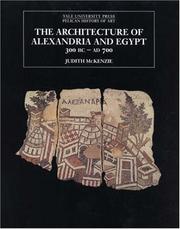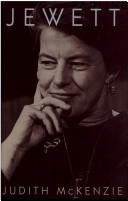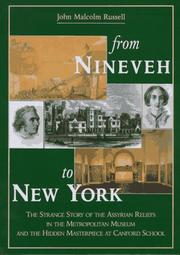| Listing 1 - 10 of 14 | << page >> |
Sort by
|

ISBN: 9780300115550 0300115555 Year: 2007 Volume: *3 Publisher: New Haven Londres Yale University press
Abstract | Keywords | Export | Availability | Bookmark
 Loading...
Loading...Choose an application
- Reference Manager
- EndNote
- RefWorks (Direct export to RefWorks)
Architecture, Ancient --- Architecture --- Architecture antique --- Architecture, Western (Western countries) --- Building design --- Buildings --- Construction --- Western architecture (Western countries) --- Art --- Building --- Archaeology --- Design and construction --- Architecture, Primitive
Book
ISBN: 019727000X Year: 1990 Volume: 1 Publisher: Oxford,New York : Oxford University Press,
Abstract | Keywords | Export | Availability | Bookmark
 Loading...
Loading...Choose an application
- Reference Manager
- EndNote
- RefWorks (Direct export to RefWorks)
Petra (Extinct city) --- Pétra (Ville ancienne) --- Architecture --- -Architecture, Western (Western countries) --- Building design --- Buildings --- Construction --- Western architecture (Western countries) --- Art --- Building --- Expertising --- -Design and construction --- -Batrāʾ (Extinct city) --- Petra (Ancient city) --- Petra (Jordan) --- Sela (Extinct city) --- Selah (Extinct city) --- Jordan --- Buildings, structures, etc --- Antiquities --- -Expertising --- -Petra (Extinct city) --- -Buildings, structures, etc --- Pétra (Ville ancienne) --- Architecture, Western (Western countries) --- Design and construction --- Batrāʾ (Extinct city) --- Buildings, structures, etc. --- Architecture, Primitive

ISBN: 1282857878 9786612857874 077356764X 9780773567641 0773518223 9780773518223 Year: 1999 Publisher: Montreal ; Ithaca : McGill-Queen's University Press,
Abstract | Keywords | Export | Availability | Bookmark
 Loading...
Loading...Choose an application
- Reference Manager
- EndNote
- RefWorks (Direct export to RefWorks)
Although Judith McKenzie deals with Jewett's childhood and university years, much of this insightful story is devoted to her public life as a Member of Parliament for the federal Liberal Party and the New Democratic Party and as a university president. President of Simon Fraser University from 1974 to 1978, she was the first woman to be appointed president of a public coeducational post-secondary institution in Canada. Jewett faced many challenges in her life, as a woman, an academic, a nationalist, and a social reformer. With tenacity and perseverance she overcame a number of social and gender barriers in place in Canada, becoming an important role model to a generation of younger women At the end of her life, she faced her greatest challenge - cancer - and fought this with her characteristic good humour, courage, and dignity.
Educators --- Educationalists --- Educationists --- Faculty (Education) --- Specialists --- Jewett, Pauline, --- Canada. --- Simon Fraser University --- Fraser University --- SFU --- Université Simon Fraser --- Presidents --- Legislators --- Women college administrators
Multi
ISSN: 05534755 ISBN: 9780300170948 0300170947 Year: 2010 Publisher: New Haven: Yale university press,
Abstract | Keywords | Export | Availability | Bookmark
 Loading...
Loading...Choose an application
- Reference Manager
- EndNote
- RefWorks (Direct export to RefWorks)

ISBN: 0300064594 Year: 1997 Publisher: New Haven London New York Yale University Press The Metropolitan Museum of Art
Abstract | Keywords | Export | Availability | Bookmark
 Loading...
Loading...Choose an application
- Reference Manager
- EndNote
- RefWorks (Direct export to RefWorks)
Beeldhouwkunst [Assyrisch-Babylonisch ] --- Sculpture [Assyro-Babylonian ] --- Sculpture [Assyro-babylonien ] --- Sculpture, Assyro-Babylonian. --- Metropolitan Museum of Art (New York, N.Y.) --- Assyria --- Nineveh (Extinct city) --- Antiquities. --- Metropolitan Museum of Art (New York, N.Y.). --- Nineveh (Extinct city). --- Antiquities
Book
ISBN: 3319746758 331974674X Year: 2019 Publisher: Cham : Springer International Publishing : Imprint: Palgrave Macmillan,
Abstract | Keywords | Export | Availability | Bookmark
 Loading...
Loading...Choose an application
- Reference Manager
- EndNote
- RefWorks (Direct export to RefWorks)
This handbook questions, debates and subverts commonly held assumptions about disability and citizenship in the global postcolonial context. Discourses of citizenship and human rights, so elemental to strategies for addressing disability-based inequality in wealthier nations, have vastly different ramifications in societies of the Global South, where resources for development are limited, democratic processes may be uncertain, and access to education, health, transport and other key services cannot be taken for granted. In a broad range of areas relevant to disability equity and transformation, an eclectic group of contributors critically consider whether, when and how citizenship may be used as a lever of change in circumstances far removed from UN boardrooms in New York or Geneva. Debate is polyvocal, with voices from the South engaging with those from the North, disabled people with nondisabled, and activists and politicians intersecting with researchers and theoreticians. Along the way, accepted wisdoms on a host of issues in disability and international development are enriched and problematized. The volume explores what life for disabled people in low and middle income countries tells us about subjects such as identity and intersectionality, labour and the global market, family life and intimate relationships, migration, climate change, access to the digital world, participation in sport and the performing arts, and much else. .
Citizenship. --- People with disabilities. --- Democracy. --- Public policy. --- Economic development. --- Social change. --- Disability Studies. --- Public Policy. --- Development and Social Change. --- Change, Social --- Cultural change --- Cultural transformation --- Societal change --- Socio-cultural change --- Social history --- Social evolution --- Development, Economic --- Economic growth --- Growth, Economic --- Economic policy --- Economics --- Statics and dynamics (Social sciences) --- Development economics --- Resource curse --- Self-government --- Political science --- Equality --- Representative government and representation --- Republics --- Cripples --- Disabled --- Disabled people --- Disabled persons --- Handicapped --- Handicapped people --- Individuals with disabilities --- People with physical disabilities --- Persons with disabilities --- Physically challenged people --- Physically disabled people --- Physically handicapped --- Persons --- Disabilities --- Sociology of disability --- Birthright citizenship --- Citizenship --- Citizenship (International law) --- National citizenship --- Nationality (Citizenship) --- Public law --- Allegiance --- Civics --- Domicile --- Political rights --- Law and legislation
Digital
ISBN: 9783319746753 Year: 2019 Publisher: Cham Springer International Publishing :Imprint: Palgrave Macmillan
Abstract | Keywords | Export | Availability | Bookmark
 Loading...
Loading...Choose an application
- Reference Manager
- EndNote
- RefWorks (Direct export to RefWorks)
This handbook questions, debates and subverts commonly held assumptions about disability and citizenship in the global postcolonial context. Discourses of citizenship and human rights, so elemental to strategies for addressing disability-based inequality in wealthier nations, have vastly different ramifications in societies of the Global South, where resources for development are limited, democratic processes may be uncertain, and access to education, health, transport and other key services cannot be taken for granted. In a broad range of areas relevant to disability equity and transformation, an eclectic group of contributors critically consider whether, when and how citizenship may be used as a lever of change in circumstances far removed from UN boardrooms in New York or Geneva. Debate is polyvocal, with voices from the South engaging with those from the North, disabled people with nondisabled, and activists and politicians intersecting with researchers and theoreticians. Along the way, accepted wisdoms on a host of issues in disability and international development are enriched and problematized. The volume explores what life for disabled people in low and middle income countries tells us about subjects such as identity and intersectionality, labour and the global market, family life and intimate relationships, migration, climate change, access to the digital world, participation in sport and the performing arts, and much else. .
Social change --- Social policy and particular groups --- Political systems --- Economic order --- Economic policy and planning (general) --- Economic conditions. Economic development --- Public administration --- sociologie --- personen met een beperking --- democratie --- burgerschap --- economische ontwikkelingen --- sociale bewegingen --- kinderen met een beperking --- klimaatverandering
Article
Abstract | Keywords | Export | Availability | Bookmark
 Loading...
Loading...Choose an application
- Reference Manager
- EndNote
- RefWorks (Direct export to RefWorks)
Book
ISBN: 9783319746753 Year: 2019 Publisher: Cham Springer International Publishing :Imprint: Palgrave Macmillan
Abstract | Keywords | Export | Availability | Bookmark
 Loading...
Loading...Choose an application
- Reference Manager
- EndNote
- RefWorks (Direct export to RefWorks)
Social change --- Social policy and particular groups --- Political systems --- Economic order --- Economic policy and planning (general) --- Economic conditions. Economic development --- Public administration --- sociologie --- personen met een beperking --- democratie --- burgerschap --- economische ontwikkelingen --- sociale bewegingen --- kinderen met een beperking --- klimaatverandering
Book
ISBN: 9781405193801 Year: 2009 Publisher: Chichester Wilzy-Blackwell
Abstract | Keywords | Export | Availability | Bookmark
 Loading...
Loading...Choose an application
- Reference Manager
- EndNote
- RefWorks (Direct export to RefWorks)
Carbonate rocks --- Sediments (Geology) --- Ginsburg, Robert N.
| Listing 1 - 10 of 14 | << page >> |
Sort by
|

 Search
Search Feedback
Feedback About UniCat
About UniCat  Help
Help News
News